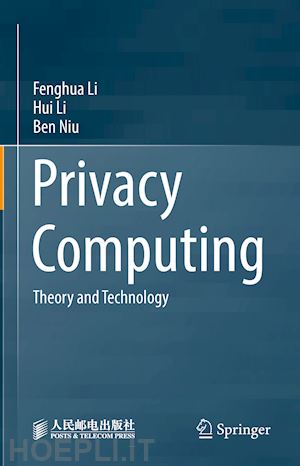
Questo prodotto usufruisce delle SPEDIZIONI GRATIS
selezionando l'opzione Corriere Veloce in fase di ordine.
Pagabile anche con Carta della cultura giovani e del merito, 18App Bonus Cultura e Carta del Docente
The continuous evolution and widespread application of communication technology, network technology and computing technology have promoted the intelligent interconnection of all things and ubiquitous sharing of information. The cross-border, cross-system, and cross-ecosystem exchange of user data has become commonplace. At the same time, difficulties in the prevention of private information abuse and lack of protection methods have become global problems. As such, there is an urgent need to intensify basic theoretical research in this field to support the protection of personal information in a ubiquitously interconnected environment.
The authors of this book proposed the concept, definition and research scope of privacy computing for the first time in 2015. This book represents their original and innovative scientific research achievement dedicated to privacy computing research, and systematically explains the basic theory and technology involved. It introduces readers to the connection between personal information and privacy protection, defines privacy protection and privacy desensitization, clarifies and summarizes the limitations of existing privacy-preserving technologies in practical information system applications, analyzes the necessity of conducting privacy computing research, and proposes the concept, definition and research scope of privacy computing. It comprehensively expounds the theoretical system of privacy computing and some privacy-preserving algorithms based on the idea of privacy computing. In closing, it outlines future research directions.
Fenghua Li received his B.S. degree in Computer Software and his M.S. and Ph.D. degrees in Computer Systems Architecture from Xidian University in 1987, 1990 and 2009 respectively. Currently, he is working as a professor and doctoral supervisor at the Institute of Information Engineering, Chinese Academy of Sciences. He is also a doctoral supervisor at Xidian University and at the University of Science and Technology of China. His research interests are in the areas of network security, privacy computing, system security and data security. He has published more than 150 papers and won the State Technological Invention Award (the Second Prize)of China in 2020.
Hui Li received his B.S. degree from Fudan University in 1990 and his M.S. and Ph.D. degrees from Xidian University in 1993 and 1998. Since 2005, he has been a professor at the School of Cyber Engineering, Xidian University, Xi’an Shaanxi, China. His research interests are in the areas of cryptography, privacy computing, and information theory. He was the chair of ACM SIGSAC CHINA from 2016 to 2020 and has published more than 300 papers.
Ben Niu received his B.S. degree in Information Security and his M.S. and Ph.D. degrees in Cryptography from Xidian University in 2006, 2010 and 2014 respectively. Currently, he is working as an associate professor and doctoral supervisor at the Institute of Information Engineering, Chinese Academy of Sciences, Beijing, China. He was a visiting scholar at Pennsylvania State University from 2011 to 2013. His main research interest is in privacy computing. He has published more than 60 papers.










Il sito utilizza cookie ed altri strumenti di tracciamento che raccolgono informazioni dal dispositivo dell’utente. Oltre ai cookie tecnici ed analitici aggregati, strettamente necessari per il funzionamento di questo sito web, previo consenso dell’utente possono essere installati cookie di profilazione e marketing e cookie dei social media. Cliccando su “Accetto tutti i cookie” saranno attivate tutte le categorie di cookie. Per accettare solo deterninate categorie di cookie, cliccare invece su “Impostazioni cookie”. Chiudendo il banner o continuando a navigare saranno installati solo cookie tecnici. Per maggiori dettagli, consultare la Cookie Policy.